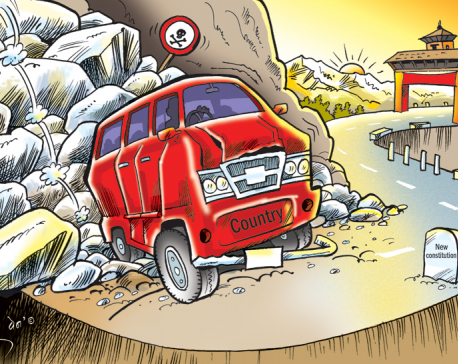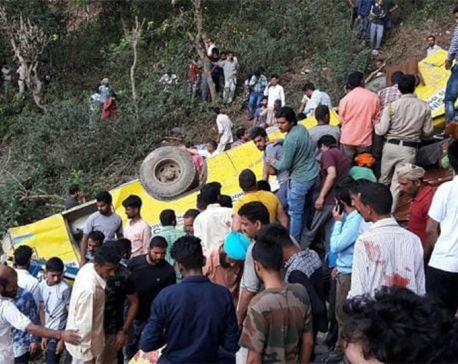
OR
The 36-km Mugling-Narayanghat road is a lifeline for Kathmandu. It connects the capital with the East-West Highway and around 10,000 vehicles pass through this road every day. Considering its strategic importance, the government in April 2015 contracted out the work of expanding the single-lane road to two-lane road, to a consortium of Nepali and Indian contractors. As per the agreement, all expansion works were to be completed within two years, or by this April. But two years down the line, less than half the work has been done. This is the case even though traffic on the road is halted for four hours every day, just for the expansion works. But project workers say they in fact get to work for no more than two hours due to ‘constant disturbances’. This is a lame excuse. The project managers surely factored in these disturbances when they agreed to complete all works by April 2017. As expansion works entail drilling through huge boulders and loosening of soil by the roadside, there have been frequent landslides on the road, which have over the past two years greatly inconvenienced those travelling via this route. Now the delay has also taken two lives.
On Monday morning, there was a big dry landslide at Chitwan’s Ghumaune, as loose rock pieces came tumbling down, wrecking eight vehicles passing through the road below, instantly killing Resham Raj Rana of Lamjung and Binaya Kumar Koiri of West Champaran, India. Two others were seriously injured. Project workers had been busy in the past few weeks trying to cut through a big rock formation at Ghumaune, an area declared ‘safe’ by project engineers and geologists alike. The way we see it, the project handlers are solely to be blamed for the tragic accident on Monday. How can you take up a time-bound project of public interest and take your own sweet time to complete it? An incident like this was long on the cards as the project has failed to secure the many rock formations it has been simultaneously working on in the stretch. This is why the construction consortium must provide adequate compensations to the families of those killed during Monday’s landslides; it must also foot the bill for the damage to the eight vehicles. Moreover, there should be a thorough investigation of the delay and the consortium, if found guilty of willful neglect, must be punished.
A meeting between the consortium representatives, construction workers and local representatives of political parties held after the accident concluded that the long delay and the failure to take safety measures contributed to the Ghumaune landslide. The meeting also decided that hereon in, all rock cutting and drilling works will be supervised by ‘road-safety’ engineers. A study to identify danger zones that were missed by earlier surveys has also been commissioned. But we are afraid that these measures could all come to nothing. The landslide at Ghumaune has been cleared and normal traffic has resumed. In a few days everyone will conveniently forget Monday’s accident and it will be business as usual—until another tragedy strikes. The only way to break this depressing cycle is to hold people accountable for what they do or, as often, for what they don’t do.
You May Like This

Tragedy of errors
The restructuring debate is not going to go away soon ... Read More...

Indian bus tragedy: Dozens of children are dead after school bus plunged into gorge
INDIA, April 10: A School bus plunged off a mountain road overnight into a deep gorge in the Himalayan foothills, killing 27 children,... Read More...

Quake took son and daughter, and now Kabul tragedy
KATHMANDU, June 22: The deadly earthquake in April last year killed her only son and daughter, destroyed her home, and... Read More...







Just In
- NRB to provide collateral-free loans to foreign employment seekers
- NEB to publish Grade 12 results next week
- Body handover begins; Relatives remain dissatisfied with insurance, compensation amount
- NC defers its plan to join Koshi govt
- NRB to review microfinance loan interest rate
- 134 dead in floods and landslides since onset of monsoon this year
- Mahakali Irrigation Project sees only 22 percent physical progress in 18 years
- Singapore now holds world's most powerful passport; Nepal stays at 98th











Leave A Comment